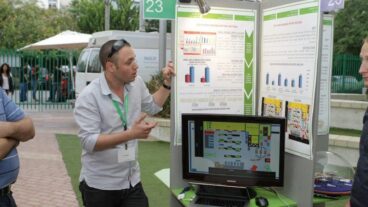Glycominds worked for seven years on the IBDX kit which cracks the code of a complex form of sugars in the body called glycans which can be used to diagnose chronic intestinal disease.In her early 30s, Cathy Richards is spunky, successful and outgoing. What most people wouldn’t know is that for nearly a year of her life she was attached to a bag into which her stool drained.
Doctors were dumbfounded as Cathy lay in the hospital for a week while her rectum was prodded with tubes in sensitive areas. While the doctors were pouring barium milkshakes down her throat, her parents tried to convince the hospital that their teenage daughter had Crohn’s disease.
It took a year, but finally doctors agreed.
Today Cathy and millions of others like her won’t have to wait a year, or even a month, for a diagnosis. That’s because the Israeli company Glycominds has developed a diagnostic blood test kit which quickly enables differential diagnosis between Crohn’s disease, ulcerative colitis and irritable bowel syndrome.
Today, instead of endless enemas, X-rays, and humiliating colonoscopies a patient can give a small vial of blood which can be analyzed in the lab within an hour. What normally takes months or years can now be ascertained by a doctor within days. In the best case, a person may only have to modify their diet. In the worst, parts of the colon may need to be removed.
“Being diagnosed earlier wouldn’t have helped me as traditional drugs don’t work on my body, but it would have saved me from horrid diagnostic tests such as colonoscopies and enemas,” says Cathy.
In other cases, the inability to diagnose and treat a patient quickly and accurately can have serious consequences. Some forms of chronic intestinal diseases, such as ulcerative colitis, make the body vulnerable to colon cancer and other infections if not treated immediately.
There are two million US doctor visits a year for bowel-related complaints with symptoms as mild as diarrhea and bloating to blood in the stool. Only about 5-6% of these people will go on to be diagnosed with the inflammatory types of Crohn’s and ulcerative colitis and be treated accordingly.
The rest of the people are categorized under the rubric of Irritable Bowel Syndrome (IBS) – a condition that affects approximately 10-20 percent of the general population and is one of the most common disorders seen by primary care physicians.
Until now, there has been no one test that gives doctors the confidence to distinguish the inflammatory bowel diseases (IBDs) of ulcerative colitis and Crohn’s disease from Irritable Bowel Syndrome (IBS). Glycominds hopes to be able to make invasive diagnostic testing a thing of the past.
The problem in diagnosing bowel disease up until now is that doctors didn’t have a sure fire tool to measure the complex signals given off by the immune system in Inflammatory Bowel Diseases which are auto-immune diseases.
Glycominds measures indicators called biomarkers which point to disease activity and show in advance what other tests, such as Magnetic Resonance Imaging, can only show after deterioration in the intestines has taken place. The company’s IBDX kit can help push a doctor to begin aggressive treatments earlier or it can help a doctor be sure that a patient does not need therapy at all.
Glycominds worked for seven years on the IBDX kit which cracks the code of a complex form of sugars in the body called glycans which can be used to diagnose chronic intestinal disease.
This month, Glycominds goes beyond theory and is now giving European doctors the power to read a patient’s biomarkers. The company has earned the European equivalent of the US Food and Drug Administration seal of approval, the CE Mark, and the first kits are expected to be on the shelves in France by June.
Through the company’s San Francisco office, Glycominds also plans on obtaining the prestigious FDA backing within the next few months and expects a product to be on the shelves in the US as early as the end of the year.
The kit is something that works alongside standard off-the-shelf laboratory equipment and therefore will be accessible to patients from remote locations in Alaska to small towns in the south.
At the core of Glycominds’ proprietary biomarker discovery engine is the GlycoChip – an array of diverse glycan molecules attached to a solid surface. This technology is used to identify interactions between the glycans on the chip and antibodies in solution. The GlycoChip recently received Notices of Allowance from the US Patent Office for two major patents to protect this technology.
The IBDX is the first in a series of cutting-edge blood tests for autoimmune and chronic inflammatory diseases that Glycominds is developing based on the company’s proprietary glycomics technology. It can eventually be applied to testing for pancreatic diabetes, psoriasis, and rheumatoid arthritis.
The IBDX kit will cost about $500 per test, but the company expects that cost is only a small fraction of the $1.7 billion currently spent in the US on doctor’s visits, diagnostic regimens, and unnecessary medication.
Talks are underway in the US with a Fortune 500 company, two mid-sized companies and a smaller one reported Avinoam Dukler, the company’s CEO. In the area of MS, the company collaborates with renowned medical leaders such as Dr. Mark Freedman, head of the Ottawa Hospital Multiple Sclerosis Clinic and Dr. Stuart Cook of the New Jersey Medical School Multiple Sclerosis Clinic.
“We were very conservative with our initial testing,” says Dukler of the IBDX kit, noting that this approach will surely help a quick roll-out in the US market.
The core of the IBDX kit will be assembled in Israel and an Austrian company will handle part of the manufacturing. Forty kits will be supplied in a box which is complete with all the chemicals a lab would need to make an accurate analysis.
Formerly the director of a patient’s advocacy group for Crohn’s Disease, Cathy has now turned her illness into a life project through her company Wellness Foods, where she develops and sells snack food for the intestinally-challenged. An expert in her field, she knows that people with bowel disorders would have a better time dealing with their illness, if they were simply diagnosed earlier – something Glycominds new kit promises to do.












